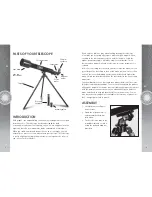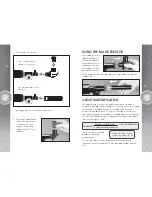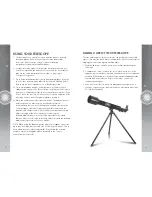
1
2
PARTS OF YOUR TELESCOPE
Lens hood
Lens cap
(not shown)
Focus
wheel
Erecting
eyepiece
Tripod
8.3mm eyepiece
Diagonal
mirror
16.6mm
eyepiece
Focus tube
Telescope tube
INTRODUCTION
With proper care and handling, you will enjoy looking at nature’s sights
for many years. This telescope has been designed for both
astronomical and terrestrial viewing, so you can not only gaze into the
night sky, but also view mountains, birds and animals at a distance.
When you stand outside and look at the sky on a clear night, you can
normally see masses of stars without using a telescope. The telescope
is really a light-gathering instrument that also magnifies the view, so
you can see far more detail.
If you only see black or grey when looking through the telescope,
it could be you are using an eyepiece with too high a magnification,
so swap to the lower-power eyepiece and check again. Using the
higher-powered eyepiece will make objects seem darker. This is
because when magnification in a telescope increases, brightness is
reduced.
As well as searching for stars with your telescope, the moon is also a
great target. The best time to look at the moon is when it is less than
half full, because the dividing line between the dark and light of the
moon (called the terminator) shows the best detail in the craters and
mountains.
You should be able to see stars and even planets with your telescope
(weather conditions permitting). The stars will twinkle and the planets,
although as bright, will show as constant lights. Looking at the Internet
with the permission or assistance of an adult will help you find star
maps and charts to help you identify objects in the universe. You can
also buy astronomy magazines that advise the locations of planets as
they change from month to month.
ASSEMBLY
1. Carefully remove all parts
from the box.
2. Stand the tripod vertically
and spread the three legs
fully apart.
3. Fit the telescope tube to the
tripod bracket and secure it
using the bolt and wing nut
provided.













